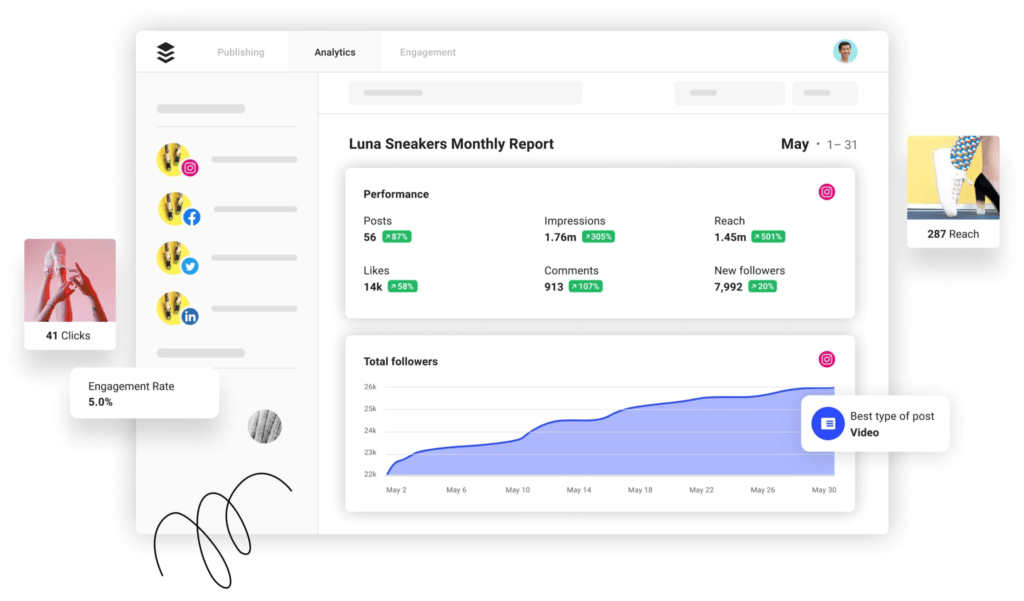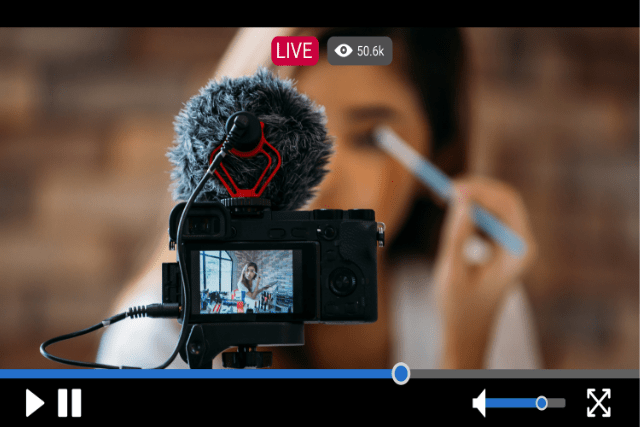Social Media marketing is the practice of using social media platforms like Facebook, Twitter, and Instagram to grow and promote your business. With the help of targeted content creation and distribution, social media marketing lets businesses connect with potential customers, raise brand awareness, and boost sales. Businesses can run successful social media marketing campaigns in a number of ways, such as by making content that is specific to each platform, setting up different posting schedules for each platform, interacting with followers in real time, using user-generated content, keeping track of engagement metrics like clicks and shares, and much more.
While there are many benefits to implementing a social media marketing strategy for your business, there are also some challenges that you may face. For example, it can be difficult to stay on top of all the latest trends and updates on each social media platform, and you may find it challenging to come up with unique and engaging content ideas that will appeal to your target audience. However, by staying organized, being strategic in your approach, and utilizing the right tools and resources, you can effectively implement a successful social media marketing strategy for your business.
If you’re looking to get started with social media marketing, there are many great resources available that can help you. For example, Social Media Examiner is an excellent resource for learning about all the latest trends and strategies in social media marketing. Additionally, sites like Facebook Business offer a wealth of information on how businesses can effectively use different features on various platforms to grow their reach and increase sales. Whether you’re just starting out with social media marketing or you’re looking to take your efforts to the next level, there are many great tools and resources available to help you succeed.
What is social media marketing and why is it important for businesses today?
Social media marketing is the use of social media platforms to promote and advertise products, services, or brands. Social media marketing allows businesses to reach a wider audience base and build brand recognition by utilizing various social media tools and platforms. With the rise in popularity of social media websites such as Facebook, Twitter, Instagram, and others, there has been an increasing focus on using these channels for business promotion.
Benefits to implementing a social media marketing strategy for your business
There are many benefits to implementing a social media marketing strategy for your business. Social media is one of the most cost-effective ways to reach and engage with potential customers online. By using online platforms like Facebook, Twitter, Instagram, and others, you can target your ideal customer base more effectively than traditional advertising methods. Building a strong online presence and engaging with customers through social media can help to improve your brand image and drive more sales.
Given the popularity of social media marketing today, it is essential for businesses to incorporate these tools into their marketing strategies. Social media platforms offer businesses a cost-effective way to reach new audiences, build brand awareness, and increase sales. Whether you are just getting started with social media or are looking to improve your current strategy, there are many steps you can take to get the most out of this powerful marketing tool.
1. Increased Brand Recognition
One of the primary benefits of social media marketing is that it can help to increase brand recognition and awareness. With over 3 billion people using social media worldwide, there is a vast audience that you can reach with your content. By regularly posting engaging and relevant content, you can reach more people and encourage them to learn more about your brand.
2. Improved Brand Loyalty
Social media marketing can also help to improve brand loyalty. When customers feel connected to a brand, they are more likely to continue doing business with that brand in the future. Social media provides an opportunity for customers to interact with brands on a personal level and develop a relationship with them.
3. More Inbound Traffic
Another benefit of social media marketing is that it can help to generate more inbound traffic to your website. When you post links to your website on social media, you are providing potential customers with an easy way to find your site and learn more about your products or services. Additionally, social media platforms such as Facebook allow you to target specific demographics, which can help to ensure that your content is being seen by people who are most likely to be interested in it.
4. Increased Search Engine Rankings
Social media marketing can also lead to increased search engine rankings. When you post links to your website on social media, you are effectively creating backlinks, which are one of the main ranking factors used by Google and other search engines. The more backlinks you have, the higher your website will rank in the search results. Additionally, when people share your content on social media, it helps to create even more backlinks and further improve your search engine rankings.
5. Cost-Effective Marketing Strategy
Social media marketing is also a very cost-effective marketing strategy. Unlike traditional marketing methods such as television or print advertising, social media marketing allows you to reach a large audience without incurring significant costs. Additionally, many social media platforms are free to use, which further reduces your marketing expenses.
6. Increased Sales and Revenue
One of the ultimate goals of any business is to increase sales and revenue. Social media marketing can help you achieve this goal by providing you with a platform to showcase your products or services and encourage people to buy them. Additionally, social media platforms such as Facebook allow you to run targeted advertising campaigns that specifically target people who are most likely to be interested in what you have to offer
Tips for successfully implementing a social media marketing strategy
Here are some tips for successfully implementing a social media marketing strategy for your business:
Research your target audience
Research your target audience and understand what types of content they engage with on social media. Different demographics use different platforms, so it is important to understand which social media sites your ideal customers frequent. For example, if you are targeting millennials and younger consumers, Instagram may be a better platform for promoting your products than Facebook or Twitter.
Identify top influencers
Identify top influencers in your industry and build relationships with them. Social media platforms are often crowded with businesses competing for the attention of potential customers and followers. In order to stand out from the crowd and reach more people, consider partnering with influential individuals or brands who already have a large following on social media. This can help to increase your visibility online and drive more traffic to your website or social media pages.
Create interesting and engaging content
Create interesting and engaging content that will appeal to your target audience. Social media is all about sharing valuable content with others, so make sure that you are posting high-quality content on a regular basis. This can include blog posts, photos, videos, infographics, and other types of visual media. Also be sure to use appropriate hashtags and tags in your posts so that your content is more easily discoverable by potential customers.
Engage with the audience
Regularly monitor and respond to comments or questions from followers. Social media marketing is a two-way street, so it’s important to engage with followers regularly to build relationships and answer any questions they may have about your brand or products. Monitor comments on your social media pages as well as direct messages or emails and responds promptly to any inquiries or concerns.
Be ready to invest
Invest in paid advertising options like Facebook ads or promoted tweets. Social media is a great tool for promoting your business and reaching a larger audience, but you may need to invest in paid advertising options to increase your visibility even further. Consider experimenting with Facebook ads or using promoted tweets on Twitter to see if these tools could be right for your business.
How can businesses use social media to connect with their customers and target audiences?
There are many ways businesses can use social media to connect with their customers and target audiences, including through popular platforms like Facebook, Instagram, and Twitter. Some of the most effective strategies include sharing valuable content that resonates with your target audience, engaging in real-time conversations with followers, and building relationships with influential individuals or brands who have a large social media following.

Paid advertising options like Facebook ads or promoted tweets can also help businesses to increase their visibility online and reach more potential customers. With the right approach and commitment, social media marketing can be an incredibly powerful tool for growing your business and connecting with your customers. So what are you waiting for? Start using these tips today to get the most out of your social media marketing efforts!
Most popular social media platforms
Many popular social media platforms can be used for marketing, including Facebook, Instagram, and Twitter.
1. Facebook
Facebook is a social networking site that was launched in 2004. It has over 2 billion active users and is available in over 70 languages. Facebook allows users to connect with friends and family, share photos and videos, join groups, and follow pages of interest. businesses can also use Facebook to create a page and promote their products or services.
2. Twitter
Twitter is a social networking site that was launched in 2006. It has over 330 million active users and is available in over 40 languages. Twitter allows users to share short messages of up to 280 characters, known as tweets. Users can also follow other users and see their tweets in their feeds. Businesses can use Twitter to promote their products or services and connect with customers.
3. LinkedIn
LinkedIn is a social networking site that was launched in 2003. It has over 500 million active users and is available in over 20 languages. LinkedIn is primarily used for professional networking, but it can also be used to find jobs, connect with business partners, and promote products or services.
4. Instagram
Instagram is a photo-sharing app that was launched in 2010. It has over 700 million active users and is available in over 30 languages. Instagram allows users to share photos and videos, follow other users, and add filters or editing effects to their photos. Businesses can use Instagram to promote their products or services through visually appealing posts.
5. Snapchat
Snapchat is a photo-sharing app that was launched in 2011. It has over 190 million active daily users and is available in over 20 languages. Snapchat allows users to share photos and videos that disappear after they have been viewed by the recipient. Businesses can use Snapchat to create engaging content that reaches a wide audience
Social media is a powerful tool for building brand awareness and reaching new audiences. Some of the most effective strategies for using these platforms include posting high-quality content on a regular basis, engaging with followers in real time, and leveraging paid advertising options like Facebook ads or promoted tweets. Additionally, influencer marketing can be an effective way to reach targeted audiences and build relationships with influential individuals or brands who have a large social media following.
How do businesses measure the success of their social media campaigns
Social media marketing allows businesses to connect directly with their customers and target audiences in a variety of ways. Platforms like Facebook, Instagram, and Twitter allow businesses to share content, engage with potential customers in real-time, and build brand recognition online.
Additionally, these platforms make it easier for businesses to connect and build relationships with influencers in their industry, which can help to increase traffic and visibility online. To effectively market your business on social media, you will need to commit to engaging with followers regularly and measuring the success of your campaigns through metrics like website traffic or engagement rates.
1. Number of Followers
One of the most common ways that businesses measure the success of their social media campaigns is by looking at the number of followers they have. The logic behind this is that the more followers a business has, the more people they are reaching with its message. Additionally, followers are often seen as more valuable than casual viewers, as they have chosen to actively follow the business and are, therefore, more likely to be interested in what they have to say.
2. Engagement Rate
Another way that businesses measure the success of their social media campaigns is by looking at their engagement rate. Engagement rate is a metric that measures how often users interact with a piece of content, such as liking, commenting, or sharing it. A high engagement rate indicates that users are finding the content interesting and relevant and are, therefore, more likely to remember it and take action based on it.
3. Reach
Reach is another metric that businesses use to measure the success of their social media campaigns. Reach measures how many people have seen a piece of content. Unlike engagement rate, reach includes both those who have chosen to follow the business and those who have simply come across the content through other means, such as being featured on another user’s page.
4. Impressions
Impressions are similar to reach in that they measure how many people have seen a piece of content. However, impressions also take into account how many times a person has seen the content. For example, if one person sees a post three times, that would count as three impressions. Businesses typically use impressions as a way to measure brand awareness, as it can be an indicator of how often people are seeing the business’s name and logo.
5. Click-Through Rate
Click-through rate (CTR) is a metric that measures how often users click on a link in a piece of content. CTR is typically used when businesses are running ads or promoting specific products or services, as it can be an indicator of how effective the ad or promotion is. A high CTR indicates that users are finding the content relevant and interesting, and are therefore more likely to take action based on it.
6. Sales Conversion Rate
Another way that businesses measure the success of their social media campaigns is by looking at their sales conversion rate. This metric measures how often users who see a piece of content go on to purchase something from the business. Sales conversion rates can be particularly useful for businesses that sell products or services online, as it can give them an indication of how effective their marketing efforts are at driving sales.
7. Time Spent on Page/Site
Time spent on page/site is another metric that businesses use to measure the success of their social media campaigns. This metric measures how long users stay on a page or site after coming across it through social media. A high time spent on page/site indicates that users find the content interesting and relevant, and are therefore less likely to click away from it quickly
Common mistakes made in social media marketing, and how can they be avoided
1. Not Defining Goals
One of the most common mistakes made in social media marketing is failing to define goals. Without clear goals, it will be difficult to measure the success of your social media campaigns and determine whether or not they are worth the time and effort. Some common goals that businesses hope to achieve with social media marketing include increasing brand awareness, generating leads, and boosting sales.
2. Not Researching Your Target Audience
Another mistake that businesses make is failing to research their target audience. It is important to understand who your target audience is and what their interests are before creating any social media content. This information can be gathered through market research or by using data from your existing customer base. Once you have a good understanding of your target audience, you can create content that is more likely to resonate with them.
3. Posting Irrelevant Content
Another common mistake businesses make on social media is posting irrelevant content. Irrelevant content is anything that does not align with the goals of your social media campaign or that does not appeal to your target audience. If you want to be successful on social media, it is important to make sure that all of your content is relevant and interesting to your audience.
4. Posting Too Much or Too Little
Another mistake businesses make is posting too much or too little on social media. If you post too often, you run the risk of annoying your followers and driving them away. On the other hand, if you post too little, you will likely struggle to build a following and generate interest in your business. The key is to strike a balance by posting regularly without bombarding your followers with too much content.
5. Not Engaging With Your Followers
Another mistake made in social media marketing is failing to engage with your followers. It is important to respond to comments and questions from your followers in order to build a relationship with them. Additionally, you should try to share their content occasionally and give them shoutouts when appropriate. By engaging with your followers, you will show them that you value their opinion and that you are interested in hearing what they have to say.
6. Ignoring Negative Feedback
When negative feedback appears on social media, it can be tempting to ignore it or delete it altogether. However, this is usually a mistake as it can come across as unprofessional and insensitive. It is important to remember that not everyone will always have positive things to say about your business – but how you handle negative feedback can say a lot about your company’s character. Instead of ignoring negative feedback, try responding in a positive way and show that you are willing to listen to constructive criticism.
7. Failing to Use Hashtags
Hashtags are a valuable tool for businesses on social media, yet many companies fail to use them properly (or at all). Hashtags can help increase the reach of your posts by making them discoverable to people who are searching for specific topics.
When using hashtags, be sure to use relevant ones that are likely to be used by people who are interested in what you have to say. Additionally, don’t use too many hashtags as this can come across as spammy and turn people off from engaging with your content.
Best Social Media Marketing Tools for e-commerce business
1. SocialBee
SocialBee is a social media management tool that helps e-commerce businesses to automate their social media marketing. The tool allows businesses to post content to multiple social media accounts, schedule posts in advance, and track the performance of their social media campaigns.

2. Hootsuite
Hootsuite is another popular social media management tool that offers similar features to SocialBee. Hootsuite also allows businesses to post content to multiple social media accounts, schedule posts in advance, and track the performance of their social media campaigns.

3. CoSchedule
CoSchedule is a social media management tool that helps businesses to optimize their social media marketing. The tool allows businesses to create and publish content, schedule posts, and track the performance of their social media campaigns. CoSchedule also provides users with insights and analytics so that they can improve their social media marketing strategy.

4. Sprout Social
Sprout Social is a social media management platform that helps businesses grow their online presence. The platform provides users with tools to create and publish content, engage with customers, and measure the performance of their social media campaigns. Sprout Social also offers a suite of analytical tools to help businesses improve their social media marketing strategy.

5. Buffer
Buffer is a social media management platform that helps businesses grow their online presence and engage with customers. The platform provides users with tools to create and publish content, schedule posts, and measure the performance of their social media campaigns. Buffer also offers a suite of analytical tools to help businesses improve their social media marketing strategy.

Summary
Social media marketing can be an effective way to build brand awareness, reach new audiences,There are many benefits to implementing a social media marketing strategy for your business. Social media allows businesses to interact directly with their customers and target audiences in a variety of ways.
By utilizing popular platforms like Facebook, Instagram, and Twitter, businesses can share valuable content, engage with potential customers in real-time, and build brand recognition online. Additionally, social media helps businesses to connect and build relationships with influencers in their industry, which can help to increase traffic and visibility online.
With the right strategy and commitment, social media marketing can be a powerful tool for growing your business. So what are you waiting for? Start using these tips today to get the most out of social media marketing!







